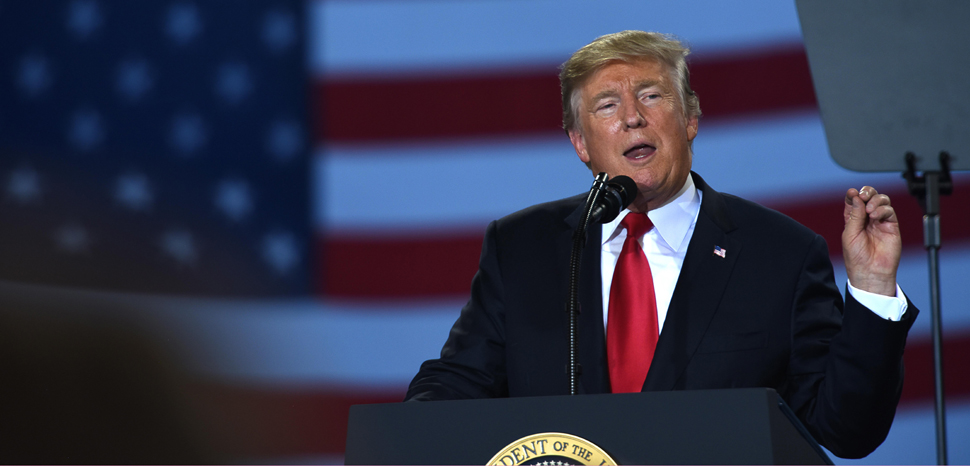US President Trump likes to act tough on international stage, but this time he may have bitten off more than he can chew. In response to his threat to impose tariffs on imported cars, the EU has warned of global retaliation against US products worth up to $300 billion. Such staggering impact would be a heavy blow to the US economy – and even if Trump is only going to ramp up his rhetoric, tariffs of this magnitude will throw a major wrench into his plans to “make America great again.”
This stark warning comes after motorcycle producer Harley-Davidson announced two weeks ago it would move a large chunk of its manufacturing abroad. In what was an embarrassment to a president readily portraying the US as immune to tariffs, the company hopes to limit the fallout from European retaliatory sanctions that came into effect on 22 June by shifting production to its sites in India, Brazil, and Thailand.
Trade tensions between the US and the EU have been running high ever since Trump imposed sanctions on several Russian industrialists and their companies in April this year. A main target was the world’s second largest aluminum producer Rusal, which provides most of the aluminum used in the European market.
These measures followed a 25 percent tariff on steel and a 10 percent tariff on aluminum imported from the EU which was announced on March 8 – ostensibly for reasons of national security. In a highly symbolic response, the EU imposed its own 25 percent tariffs on iconic American products such as Harleys, Levi’s jeans, and Kentucky bourbon, affecting $3.2 billion worth of goods overall.
America’s European allies have good reason not to back down on Washington’s bullying. After all, Trump’s aggressive sanctions and tariff regime didn’t just mark the violent end of decades of functional transatlantic relations. They also sparked a trade war whose effects will be devastating to both sides, even if the final extent of the damage is difficult to predict. But if politicians on both sides of the Atlantic want to get a taste of what future trade wars mean, they need look no further than what happened to aluminum.
America’s European allies have good reason not to back down on Washington’s bullying.
The unilateral sanctions Trump imposed on Russian businessmen and their firms in April have left the EU grasping for straws. The sanctions crossed a line because when they come into force in October, they will cut European industries off from vital raw material supplies, especially aluminum, and consequently stand to inflict real and lasting economic damage to the continent.
The continent’s biggest economies – Germany, France and Italy – are propelled by highly sophisticated and technologically specialized small and medium enterprises (SMEs), many of which have strong industrial ties to Rusal. However, because of the extraterritorial nature of the US sanctions, they are effectively banned from engaging in any business with blacklisted companies, as they would expose themselves to wide-ranging sanctions as well.
European leaders scrambled immediately to shield their SMEs from the impending fallout by attempting to negotiate exemptions with Washington. European Aluminium, one of many industry groups putting pressure on leaders to resolve the issue, counseled that “If a cluster of this value chain is disrupted it has consequences for the whole value chain.”
For their part, German firms are facing an unsurmountable dilemma. They have traditionally had close ties to Russia with business connections worth billions, but could now have to deal with supply shortages owing to their high reliance on Russian aluminum. Consequently, Germany’s WirtschaftsVereinigung Metalle, a major industry association of 655 metals companies, sounded the alarm bell predicting exactly that. The association fears that production lines will have to be halted especially if a major aluminum smelter in Dunkerque should have to close due to aluminum supply cuts.
With so much at stake, the European tariffs clearly hit the US heartland where it hurts. In fact, Harley’s move shows that Trump’s trade policy agenda is backfiring. And given the close interconnectedness of international markets, the tariffs on European steel and aluminum will cause price levels of certain goods to rise for US consumers – with dramatic consequences for the economy.
The US sources most of its aluminum and steel from Canada, Russia, and Mexico and the tariffs will lead to a surge in domestic prices for these materials – prices that will be passed on to consumers. The US car industry will be especially affected as cars become more expensive, as the Alliance of Automobile Manufacturers, which includes General Motors and Volkswagen AG, warns. According to the group’s spokesperson: “Keeping vehicles affordable means higher sales, more auto sector jobs, and faster fleet turnover – translating into fuel economy gains and safety improvements.”
Similar concerns have been voiced by Global Automakers president John Bozzella, arguing that “Any retaliation by our trading partners will multiply this harm and do nothing to encourage U.S. exports.” The downward spiral is only set to worsen if Trump makes good on his threat to impose car tariffs. German carmaker BMW quickly warned the tariffs will cause a sharp decline in investment into its South Carolina plant, BMW’s largest globally. The plant could close and move production to more competitive locations, leading to greater unemployment across the value chain.
Trump infamously said that trade wars are “good, and easy to win,” but at that time he may have grossly underestimated the EU’s willingness to stand up to opposition and defend its industrial heartland. The EU’s retaliation hit the US where it hurts and it stands to reason that any other retaliatory measures the EU may impose in the future will have similar effects on the US economy. With global-scale retaliation looming, it is clear that trade wars are coming back to haunt those who started them.
The opinions, beliefs, and viewpoints expressed by the authors are theirs alone and don’t reflect any official position of Geopoliticalmonitor.com.




